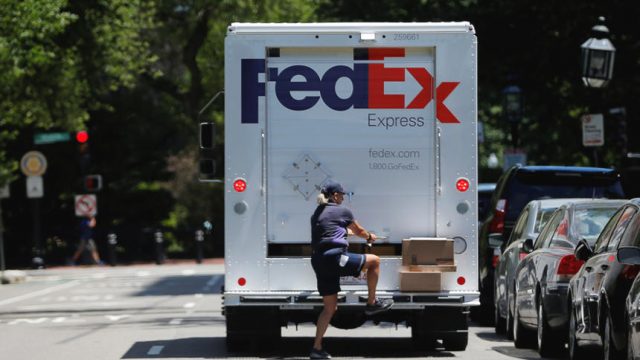Ban Tax Breaks for Businesses Moving Within the State

A Fedex driver delivers packages in Boston, Massachusetts, U.S. June 15, 2016. REUTERS/Brian Snyder
“Lawmakers should ban incentives for companies that move from one North Dakota community to another—because when it comes to within-the-state shifts, incentives always wind up with this result: Taxpayers lose,” writes Tom Dennis in an editorial for the Grand Forks Herald today.
He’s right.
[mks_pullquote align=”right” width=”300″ size=”24″ bg_color=”#ffffff” txt_color=”#000000″]Do we really want to open the door to an intrastate economic development arms race, with various North Dakota communities squabbling over the jobs and commerce brought by companies to their areas?[/mks_pullquote]
What he’s referencing is a tax exemption given to FedEx which is moving a facility from Grand Forks to Fargo. Initially this caused some controversy because a FedEx representative told Fargo City Commissioner Tony Gehrig the company would have moved to Fargo even without the incentive, making many (including this observer) wonder why the city approved the incentive at all.
Since then both FedEx and the city leaders who voted for the incentive have walked that back, claiming that FedEx considered the incentives when planning their move all along.
But that only brings us back to the point the Herald makes today. Should one North Dakota city be able to use these incentives to poach a business from another North Dakota city? Do we really want to open the door to an intrastate economic development arms race, with various North Dakota communities squabbling over the jobs and commerce brought by companies to their areas?
These economic development policies have a dubious sort of track record to begin with. I’m not convinced they work as well as certain politicians and business leaders would have us believe. Certainly they seem completely unnecessary when we’re are talking about a gigantic, well-established, internationally-operating company like FedEx which is more than likely just collecting these incentives as gravy on moves they were going to make anyway.
But that’s a debate for another time.
At the very least, I think most of us can agree that it’s a poor use of the policies to lure companies already operating in one part of the state to another part of the state.
In that game, as Dennis notes, the taxpayers definitely lose.




